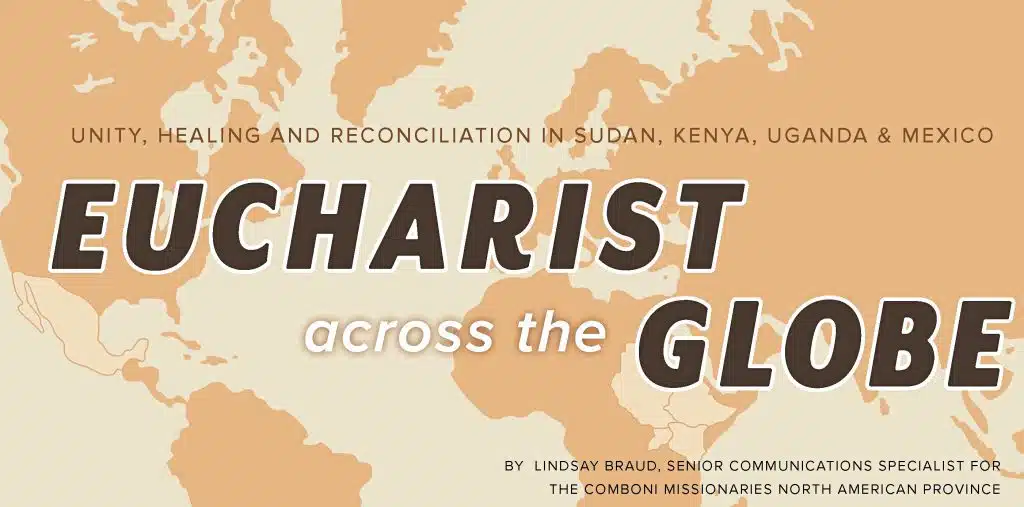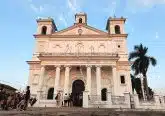Eucharist across the Globe

 In rural South Sudan, there are few places where people from rival tribes can come together in peace and openness. As a South Sudanese, Comboni Missionary Father Louis Okot was aware of this division when he was assigned to the Lomin Mission in Kejo-keji, where he provided pastoral care at the local parish and Comboni Comprehensive College.
In rural South Sudan, there are few places where people from rival tribes can come together in peace and openness. As a South Sudanese, Comboni Missionary Father Louis Okot was aware of this division when he was assigned to the Lomin Mission in Kejo-keji, where he provided pastoral care at the local parish and Comboni Comprehensive College.
“It is a multi-cultural and tribal school. Knowing the situation of my country with high cultural and tribal conflicts, the celebration of the Eucharist was the only space where values and symbols for coexistence were found, received and assimilated,” Father Okot said. “We priests made use of this space to cultivate a new culture and tribe that emerge inspiringly from Jesus’ self-offering for the reconciliation of the unreconciled.”
Father Okot recalled one time after Mass when students were eager to share with him their new experience of finding in the Eucharist a symbol of unity, healing and reconciliation. “The Eucharist is the source and summit of the whole Christian faith, but no Christian community is built if it does not have its roots in the celebration of the Eucharist,” he said.
In the mission area’s 14,000 square miles of northern Kenya, Comboni Missionary Father Mariano Tibaldo had a similar experience in the Pokot region. It was divided into 15 outstations, each with a small mud building that functioned as a church, a meeting place and even a school. “The chapel was one of the few places—I would say the only place—where people from different cultures could meet and interact,” he said.
“I remember a Eucharist celebration during a military operation against cattle rustlers. People had taken refuge in the mission and the church … [to escape] the violence,” Father Mariano recalled. “On Sundays, after cleaning the church and stacking mattresses and blankets… the Eucharist would begin. It was a time of meeting and reconciliation, a time to call for peace and to reiterate that cultural and ethnic differences should not break the unity built on belonging to God’s people.”
When cultural differences have kept generations of people apart, the process of changing hearts and minds takes time and patience. The encounter in the Eucharist and the safe space provided in the mission chapels can begin tearing down barriers.
Teaching the meaning of the Eucharist across cultures and languages is challenging, but local traditions sometimes foster understanding. Comboni Missionary Father Paul Donohue described a ritual (tumu kir) that the northern Uganda Acholi people used to resolve disagreements and reunite families. They sort through the facts, which after a serious altercation can take days, but once the situation is fully understood and resolved, a goat or lamb is slaughtered and everyone shares in the meal of tumu kir, loosely translated as “a lamb is offered to remove the poison of division.” “When everyone eats the same meal at the same time from the same bowl, it signifies that there is no longer animosity that can poison the community life,” Father Donohue said.
He explained, “When I would celebrate the Eucharist… at the appropriate time I would say ‘Here is the Lamb of God who takes away the sins of the world.’ I was drawing on the people’s experience of tumu kir in their family life. It is not that poor, dead lamb that removes animosity, but rather the consecrated bread and wine of the Risen Lord who reconciles us.”
Delivering the Eucharist in these vast areas cannot happen in every parish every Sunday as it does throughout much of the U.S. There are too few priests, and remote chapels become inaccessible when road conditions deteriorate.
For many years, Comboni Missionary Father Domenico Guarino worked in San Isidro Parish in Valle de Chalco, Mexico, where the faithful did not have a priest on some Sundays. “We strongly encouraged the community to attend the celebration led by the laypeople, lectors and extraordinary ministers of Holy Communion, who had been trained and fully prepared to carry out these very important roles,” he said. “At the beginning it wasn’t easy at all; the community had to be prepared for this ecclesial challenge. Today, laypeople, led by the Holy Spirit, continue to be a vital part of the church.”
In all of our parishes and communities, Father Guarino concluded, “The Eucharist gives us the strength for human and social change.”
This article appeared in the June 2024 edition of The Catholic Telegraph Magazine. For your complimentary subscription, click here.













